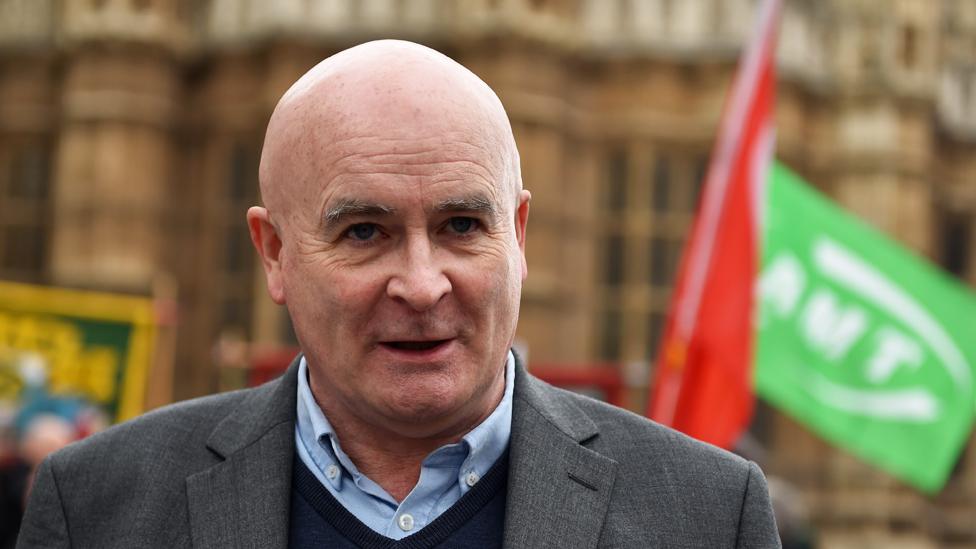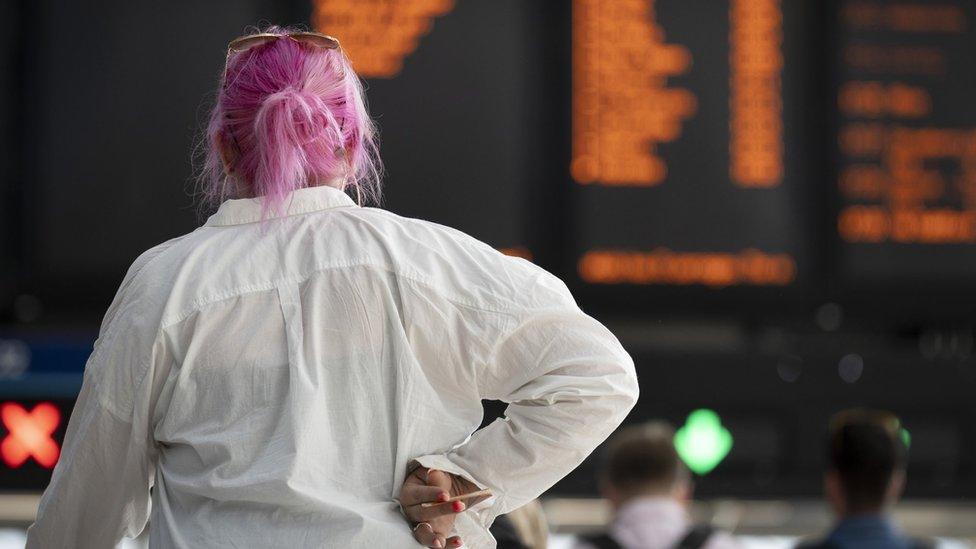Train strikes: Minister hopes Christmas walkouts can be stopped
- Published
The transport secretary says there was a “shared agreement” that the dispute had gone on for too long.
The new transport secretary has said he hopes the rail dispute can be solved before Christmas with "realism" from both trade unions and rail employers.
However, Mark Harper said that pay rises that match the surging cost of living will not be possible due to the UK's "economic circumstances".
It came as he agreed to help unions to try to reach a deal with train firms ahead of fresh strikes next month.
The RMT union said a meeting with Mr Harper had been "positive".
Mr Harper's two predecessors had refused to get involved in the dispute, although the transport secretary said it was not his role to do the "detailed negotiations".
"I do accept I have a role in this process, which is to try to encourage the two sides to come to an agreement and also to make sure... the process moves along as quickly as we can," he told the BBC.
Passengers have been told to expect major disruption after the RMT said it would stage four 48-hour strikes next month in a dispute over job security, pay and conditions.
Some 40,000 workers will walk out on 13-14 and 16-17 December, and 3-4 and 6-7 January, with delays and cancellations expected on the days around the strikes as well.
The RMT, which has staged eight strikes since June, claims rail operating companies and Network Rail - which manages the track - are not negotiating in good faith.
But Mr Harper has now agreed to help both sides come back to the table and will write to RMT boss Mick Lynch setting out the terms under which talks can take place.
Mr Harper said there was a "shared agreement" that the dispute had gone on for too long, but would not commit to offering more government money to help resolve the dispute.
Instead he maintained that industry reform was needed to deliver the savings which would enable a "reasonable pay rise" for staff.
He added: "Being realistic, [that pay rise] is not going to match the level of inflation, I think people need to understand that and there needs to be some realism in this process.
"But to be fair I think there is realism in this process from both the trade unions and employers, and I hope we can resolve the dispute as fast as we can before Christmas."
Inflation - the rate at which prices rise - is currently at a 41-year high of 11.1% as the war in Ukraine drives up energy and food prices.
Mick Lynch says he had a “positive meeting” with Transport Secretary Mark Harper over rail strikes.
Mr Lynch told reporters his meeting with the new transport secretary was "positive in the sense we have got rid of the bellicose nonsense we had from [former transport secretary] Grant Shapps and his cohort in his era and we're now starting to get a dialogue".
He added: "You've heard [Mr Harper] say he's going to be a facilitator towards a settlement or resolution of the dispute. And we've said it's no good us having these warm words, we've had them from his [immediate] predecessor Anne-Marie Trevelyan, but nothing actually happened."
He added the dispute now needed "pace" to be resolved.
"I'm sure the travelling public and the businesses around the country and the economy, want to see this dispute settled in a proper way."

Does today's meeting help resolve the dispute?

The RMT has repeatedly accused the government of tying the hands of the rail employers who are directly taking part in negotiations.
Ultimately, the government holds the purse strings, has set the parameters for negotiations, and has sign-off on what is agreed.
But ministers have maintained their place isn't at the table: it's for unions and rail employers to hammer out a deal.
Real progress is thought to have been made in recent talks.
But when he announced fresh strikes earlier this week, Mick Lynch said the secretary of state had blocked train companies from making an offer.
He also said the employers were "saying different things to different people, sometimes at the same time".
At today's meeting, the transport secretary agreed he would write to write to the RMT leader very soon, setting out how the process would work going forward.
And when I spoke to Mark Harper, he insisted he "certainly didn't block anything".
However, he acknowledged something went on in the run-up to Tuesday's strike announcement that "caused a problem".
Part of the point of setting out a clear process, he said, would be that "whatever happened, doesn't end up happening again".

Next month's walkouts are expected to hit people travelling for Christmas, with the pub industry warning it could ruin their busiest week of the year.
The strikes will affect people travelling to see comedian Peter Kay's comeback shows in London and Birmingham on 16 and 17 December, as well as singer Paolo Nutini's gigs in Glasgow on 13, 14 and 16 December.
It also emerged on Thursday that the TSSA union will ask its Network Rail members if they want to continue taking industrial action.
The union is balloting more than 2,500 operational staff - including station staff, control, maintenance, support and operational staff - as the current mandate for strike action runs out in January.

How will the rail strikes affect your journey? What alternative forms of transport are you using? Share your experiences by emailing haveyoursay@bbc.co.uk, external.
Please include a contact number if you are willing to speak to a BBC journalist. You can also get in touch in the following ways:
WhatsApp: +44 7756 165803
Tweet: @BBC_HaveYourSay, external
Please read our terms & conditions and privacy policy
If you are reading this page and can't see the form you will need to visit the mobile version of the BBC website to submit your question or comment or you can email us at HaveYourSay@bbc.co.uk, external. Please include your name, age and location with any submission.
- Published23 November 2022

- Published16 November 2022

- Published9 May 2024
